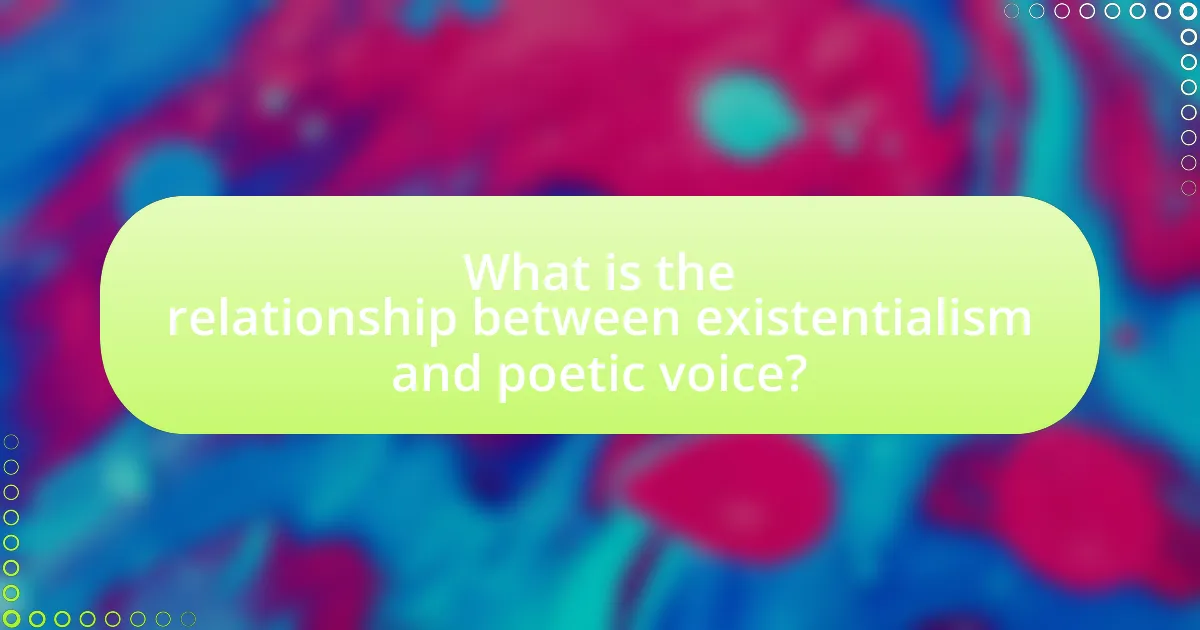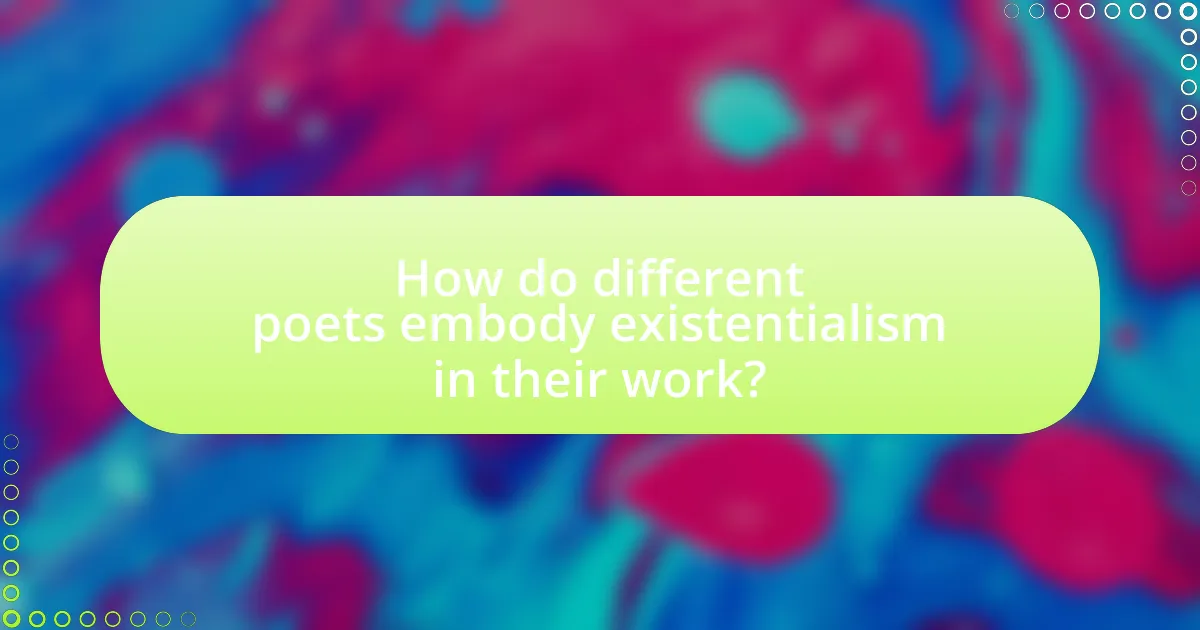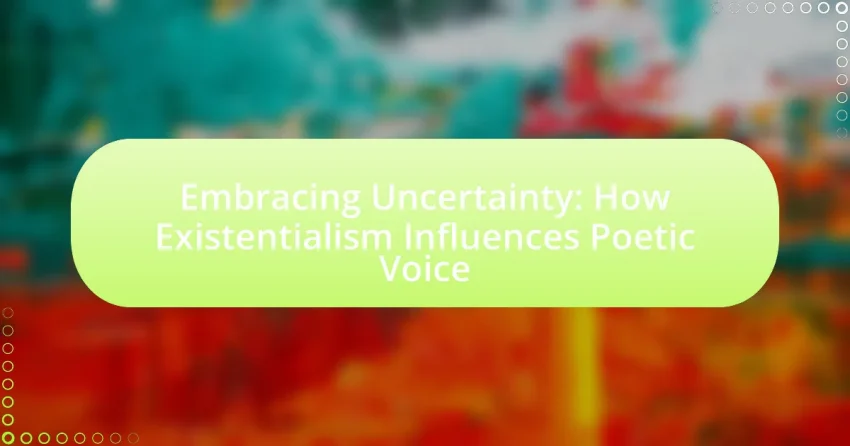The article “Embracing Uncertainty: How Existentialism Influences Poetic Voice” examines the profound impact of existentialist philosophy on poetry, particularly in shaping themes of individual experience, freedom, and the search for meaning in an absurd world. It highlights how poets like T.S. Eliot and Sylvia Plath utilize fragmented narratives and introspective language to explore existential themes such as alienation, despair, and identity. The discussion includes the techniques poets employ to convey uncertainty, the emotional responses elicited in readers, and practical approaches for poets to embrace ambiguity in their work, ultimately illustrating the intricate relationship between existentialism and poetic expression.

What is the relationship between existentialism and poetic voice?
Existentialism profoundly influences poetic voice by emphasizing individual experience and the search for meaning in an absurd world. This philosophical movement, articulated by thinkers like Jean-Paul Sartre and Simone de Beauvoir, encourages poets to explore themes of existence, freedom, and authenticity. Poets such as T.S. Eliot and Sylvia Plath reflect existentialist ideas through their use of fragmented narratives and introspective language, capturing the complexities of human emotion and the struggle for identity. The relationship is evident in how existentialist concepts shape the tone, structure, and thematic depth of poetry, allowing for a rich exploration of the human condition.
How does existentialism shape the themes in poetry?
Existentialism shapes the themes in poetry by emphasizing individual experience, freedom, and the search for meaning in an indifferent universe. Poets influenced by existentialist thought often explore feelings of alienation, despair, and the absurdity of life, reflecting the philosophical tenets of figures like Jean-Paul Sartre and Albert Camus. For instance, the works of poets such as T.S. Eliot and Sylvia Plath illustrate existential themes through their focus on personal identity and the struggle against existential angst. This thematic exploration allows readers to confront their own uncertainties and the complexities of human existence, making existentialism a powerful lens through which poetry can be understood.
What existential themes are commonly explored in poetry?
Existential themes commonly explored in poetry include the search for meaning, the nature of existence, the inevitability of death, and the experience of alienation. Poets often delve into the human condition, questioning the purpose of life and the individual’s place in the universe. For instance, works by poets like T.S. Eliot and Sylvia Plath reflect on existential despair and the struggle for identity amidst chaos. These themes resonate with readers as they confront their own uncertainties and existential dilemmas, illustrating the profound impact of existentialism on poetic expression.
How do poets express uncertainty through existential themes?
Poets express uncertainty through existential themes by exploring the complexities of human existence, often questioning the meaning of life, identity, and the nature of reality. This exploration manifests in their use of ambiguous language, fragmented structures, and introspective imagery, which reflect the inherent unpredictability of life. For instance, poets like Samuel Beckett and T.S. Eliot utilize disjointed narratives and existential motifs to convey feelings of dislocation and doubt, emphasizing the struggle to find clarity in an uncertain world. Such techniques effectively illustrate the tension between the search for meaning and the acceptance of life’s uncertainties, reinforcing the existential belief that individuals must navigate their own paths amidst ambiguity.
Why is embracing uncertainty important in existentialist poetry?
Embracing uncertainty is important in existentialist poetry because it reflects the inherent ambiguity of human existence and the search for meaning in a chaotic world. Existentialist poets, such as Samuel Beckett and T.S. Eliot, often explore themes of doubt, isolation, and the fluidity of identity, which resonate with the unpredictable nature of life. This approach allows readers to confront their own uncertainties and engage with the complexities of existence, fostering a deeper understanding of the human condition. By articulating the struggle with uncertainty, existentialist poetry invites introspection and challenges conventional narratives, ultimately enriching the poetic voice.
How does uncertainty influence a poet’s creative process?
Uncertainty significantly influences a poet’s creative process by fostering exploration and innovation in their work. When poets confront ambiguity, they often delve into complex emotions and themes, allowing for a richer and more nuanced expression of their thoughts. This exploration can lead to unexpected insights and unique perspectives, as poets navigate the unknown aspects of their experiences and feelings. For instance, the existentialist philosophy emphasizes the importance of confronting uncertainty, which can inspire poets to articulate their struggles with meaning and existence, ultimately enhancing the depth and authenticity of their poetry.
What role does ambiguity play in the interpretation of poetic voice?
Ambiguity significantly enhances the interpretation of poetic voice by allowing multiple meanings and emotional depths to coexist within a single text. This multiplicity invites readers to engage more deeply with the poem, as they must navigate the uncertainties and complexities presented by the poet. For instance, poets like T.S. Eliot and Emily Dickinson often employ ambiguous language and imagery, which encourages varied interpretations and personal connections to the work. The presence of ambiguity reflects existential themes, where meaning is not fixed but rather fluid, mirroring the complexities of human experience and perception. This dynamic interplay between ambiguity and interpretation enriches the reader’s engagement with the poetic voice, making it a vital aspect of understanding poetry.

How do different poets embody existentialism in their work?
Different poets embody existentialism in their work by exploring themes of individual existence, freedom, and the absurdity of life. For instance, T.S. Eliot’s “The Love Song of J. Alfred Prufrock” reflects the inner turmoil and paralysis of modern existence, illustrating the struggle for meaning in a fragmented world. Similarly, Sylvia Plath’s poetry, particularly in “Lady Lazarus,” confronts the concepts of identity and rebirth, emphasizing the individual’s confrontation with despair and the search for self amidst chaos. Furthermore, Charles Bukowski’s raw and unfiltered style in works like “Post Office” captures the absurdity of everyday life and the quest for authenticity in a conformist society. These poets utilize existential themes to delve into the complexities of human experience, highlighting the tension between personal freedom and societal constraints.
What are the distinct styles of existentialist poets?
Existentialist poets exhibit distinct styles characterized by themes of absurdity, individualism, and existential angst. These poets, such as Samuel Beckett and Paul Sartre, often employ fragmented structures, stream-of-consciousness techniques, and stark imagery to convey the complexities of human existence. Their works reflect a deep engagement with the human condition, emphasizing the search for meaning in a seemingly indifferent universe. For instance, Beckett’s use of minimalism and repetitive language illustrates the futility of communication, while Sartre’s existential themes challenge traditional narrative forms, reinforcing the notion of personal freedom and responsibility.
How do these styles reflect their philosophical beliefs?
The styles of poetry influenced by existentialism reflect philosophical beliefs by emphasizing individual experience, freedom, and the inherent absurdity of life. Existentialist poets often utilize fragmented structures, stream-of-consciousness techniques, and vivid imagery to convey the complexity of human emotions and the search for meaning in a chaotic world. For instance, the use of disjointed narratives mirrors the existential belief that life lacks inherent order, as seen in the works of poets like T.S. Eliot and Samuel Beckett, who explore themes of alienation and existential dread. These stylistic choices serve to illustrate the tension between the desire for meaning and the recognition of life’s uncertainties, aligning closely with existentialist thought.
What techniques do poets use to convey existential uncertainty?
Poets convey existential uncertainty through techniques such as ambiguity, imagery, and stream of consciousness. Ambiguity allows poets to present multiple interpretations of existence, reflecting the complexity of human experience. For instance, T.S. Eliot’s “The Love Song of J. Alfred Prufrock” employs ambiguous language to express the protagonist’s indecision and existential dread. Imagery creates vivid representations of uncertainty, as seen in Sylvia Plath’s “Lady Lazarus,” where stark images evoke feelings of despair and rebirth. Stream of consciousness, utilized by poets like Virginia Woolf, captures the chaotic flow of thoughts, mirroring the confusion inherent in existential questioning. These techniques effectively illustrate the struggle with meaning and identity in an uncertain world.
Which notable poets are influenced by existentialist thought?
Notable poets influenced by existentialist thought include T.S. Eliot, Sylvia Plath, and Paul Celan. T.S. Eliot’s works, such as “The Love Song of J. Alfred Prufrock,” reflect themes of alienation and the search for meaning, which are central to existentialism. Sylvia Plath’s poetry often explores the individual’s struggle with identity and existence, as seen in her collection “Ariel.” Paul Celan’s poignant verses, particularly in “Death Fugue,” grapple with the absurdity of life and the human condition, embodying existentialist ideas. These poets exemplify how existentialism shapes poetic expression and themes.
What specific works exemplify this influence?
Specific works that exemplify the influence of existentialism on poetic voice include “The Waste Land” by T.S. Eliot and “The Stranger” by Albert Camus. “The Waste Land” reflects existential themes through its fragmented structure and exploration of disillusionment in a post-war world, while “The Stranger” delves into absurdism and the search for meaning in an indifferent universe. Both works illustrate how existentialist thought shapes the expression of human experience and uncertainty in poetry.
How do these poets address the concept of meaning in their poetry?
These poets address the concept of meaning in their poetry by exploring existential themes that reflect the ambiguity and complexity of human experience. They often utilize imagery, symbolism, and fragmented narratives to convey the uncertainty of existence, emphasizing that meaning is subjective and often elusive. For instance, poets like T.S. Eliot and Sylvia Plath incorporate personal and societal disillusionment, illustrating how their characters grapple with the search for meaning in a chaotic world. This approach aligns with existentialist philosophy, which posits that individuals must create their own meaning in life despite inherent uncertainties.
What are the implications of existentialism on the reader’s experience?
Existentialism profoundly impacts the reader’s experience by encouraging introspection and personal meaning-making. This philosophical approach emphasizes individual existence, freedom, and choice, prompting readers to confront their own beliefs and values. For instance, existentialist literature often presents characters facing absurdity and isolation, which can resonate with readers’ own feelings of uncertainty and existential dread. This connection fosters a deeper engagement with the text, as readers reflect on their own lives in relation to the themes presented. Additionally, existentialism challenges readers to embrace ambiguity and the lack of inherent meaning in life, which can lead to a transformative experience as they navigate their own understanding of existence.
How does existentialist poetry challenge readers’ perceptions?
Existentialist poetry challenges readers’ perceptions by confronting them with themes of absurdity, freedom, and the search for meaning in a seemingly indifferent universe. This genre often employs stark imagery and fragmented structures to reflect the chaos of human existence, prompting readers to question their own beliefs and assumptions about life. For instance, poets like Samuel Beckett and Paul Celan utilize disjointed narratives and existential motifs to illustrate the struggle for identity and purpose, thereby encouraging readers to engage with their own existential dilemmas. This engagement fosters a deeper understanding of the complexities of human experience, ultimately reshaping how individuals perceive their reality.
What emotional responses does existential uncertainty evoke in readers?
Existential uncertainty evokes a range of emotional responses in readers, including anxiety, introspection, and a sense of liberation. Readers often experience anxiety as they confront the ambiguity of existence and the lack of definitive answers to life’s fundamental questions. This emotional turmoil can lead to deep introspection, prompting individuals to reflect on their own beliefs, values, and the meaning of their lives. Additionally, some readers may find a sense of liberation in embracing uncertainty, as it allows for personal freedom and the exploration of diverse perspectives. Research by Irvin D. Yalom in “Existential Psychotherapy” highlights how confronting existential themes can lead to personal growth and a deeper understanding of oneself, reinforcing the emotional complexity that existential uncertainty brings to readers.
How can readers find personal meaning in existentialist poetry?
Readers can find personal meaning in existentialist poetry by engaging with the themes of individual existence, freedom, and the search for authenticity. Existentialist poetry often reflects the complexities of human experience, prompting readers to confront their own beliefs, emotions, and choices. For instance, poets like Jean-Paul Sartre and Samuel Beckett explore the absurdity of life, encouraging readers to reflect on their own struggles with meaning and identity. This introspection allows readers to connect their personal experiences with the universal questions posed in the poetry, fostering a deeper understanding of themselves and their place in the world.
What practical approaches can poets take to embrace uncertainty in their work?
Poets can embrace uncertainty in their work by experimenting with form and structure, allowing for spontaneity and unpredictability in their writing process. This approach encourages poets to break free from traditional constraints, fostering creativity and exploration of new ideas. For instance, utilizing free verse or stream-of-consciousness techniques can lead to unexpected imagery and themes, reflecting the inherent unpredictability of life. Additionally, engaging with prompts that challenge their usual perspectives can stimulate fresh insights and interpretations, further embracing the unknown. This method aligns with existentialist principles, which emphasize the acceptance of uncertainty as a fundamental aspect of human experience.
How can poets cultivate a voice that reflects existential themes?
Poets can cultivate a voice that reflects existential themes by exploring personal experiences, questioning the nature of existence, and employing a tone that conveys uncertainty and introspection. This approach allows poets to delve into the complexities of human existence, as seen in the works of existentialist writers like Jean-Paul Sartre and Albert Camus, who emphasized the absurdity of life and the search for meaning. By using vivid imagery, fragmented structures, and philosophical inquiries, poets can effectively communicate the emotional weight of existential dilemmas, thereby resonating with readers who grapple with similar questions about life, purpose, and identity.
What exercises can help poets explore uncertainty in their writing?
Poets can explore uncertainty in their writing through exercises such as free writing, where they write continuously for a set period without worrying about grammar or structure, allowing thoughts to flow freely and revealing hidden uncertainties. Another effective exercise is the use of prompts that challenge poets to write from unfamiliar perspectives or about ambiguous subjects, which encourages them to confront and articulate their uncertainties. Additionally, engaging in collaborative writing with other poets can introduce new ideas and interpretations, further deepening their exploration of uncertainty. These exercises are supported by the understanding that embracing ambiguity can lead to richer, more nuanced poetic expression, as seen in the works of poets like Rainer Maria Rilke, who often grappled with existential themes.
